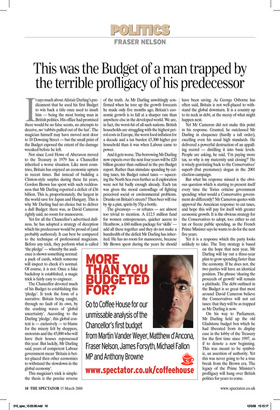This was the Budget of a man trapped by the terrible profligacy of his predecessor
It says much about Alistair Darling’s predicament that he used his first Budget to win back a title once used to insult him — being the most boring man in British politics. His office had promised there would be no false scents, no attempts to deceive, no ‘rabbits pulled out of the hat’. The magician himself may have moved next door to 10 Downing Street — but the small print of the Budget exposed the extent of the damage wreaked before he left.
Not since Lord Howe of Aberavon moved to the Treasury in 1979 has a Chancellor inherited a worse situation. Like most countries, Britain has enjoyed an economic upturn in recent times. But instead of building a Clinton-style surplus during these fat years, Gordon Brown has spent with such recklessness that Mr Darling reported a deficit of £36 billion. This is, proportionately, the largest in the world save for Japan and Hungary. This is why Mr Darling had no choice but to deliver a dull Budget: there was, as David Cameron rightly said, no room for manoeuvre.
The Chancellor devoted much of his Budget to establishing this ‘pledge’. It took the form of a narrative: Britain being caught, through no fault of its own, by the crashing waves of ‘global uncertainty’. According to the Darling ‘pledge’, this global context is — exclusively — to blame for the misery felt by shoppers, motorists and the 45,000 who will have their houses repossessed this year. But luckily, Mr Darling said, years of competent Labour government mean ‘Britain is better-placed then other economies to withstand the slowdown in the global economy’.
This magician’s trick is simple: the thesis is the precise reverse of the truth. As Mr Darling unwittingly confirmed when he tore up the growth forecasts he made only five months ago, Britain’s economic growth is to fall at a sharper rate than anywhere else in the developed world. We are, in fact, the worst-hit of all such nations. British households are struggling with the highest petrol costs in Europe, the worst food inflation for a decade and a tax burden £5,300 higher per household than it was when Labour came to power.
And it gets worse. The borrowing Mr Darling now expects over the next four years will be £20 billion greater than outlined in the pre-Budget report. Rather than stimulate spending by cutting taxes, his Budget raised taxes — squeezing the North Sea even further as if exploration were not hit badly enough already. Each tax was given the moral camouflage of fighting perceived social or environmental problems. Drunks on Britain’s streets? Then beer will rise by 4p a pint, spirits by 55p a bottle.
The giveaways — or rebates — are almost too trivial to mention. A £12.5 million fund for women entrepreneurs, quicker access to Heathrow, a £60 million package for ‘skills’ — add all these together and they do not make a hundredth of the deficit Mr Darling has inherited. He has no room for manoeuvre, because Mr Brown spent during the years he should have been saving. As George Osborne has often said, Britain is not well-placed to withstand the global downturn. It is a country up to its neck in debt, at the mercy of what might happen next.
Yet Mr Cameron did not make this point in his response. Granted, he outclassed Mr Darling in eloquence (hardly a tall order), excelling even his usual high standards. He delivered a powerful destruction of an appalling record — distilling it into basic levels. People are asking, he said, ‘I’m paying more tax, so why is my maternity unit closing?’ He is wisely gravitating back to the Conservatives’ superb (but premature) slogan in the 2001 election campaign.
But what his response missed is the obvious question which is starting to present itself every time the Tories criticise government spending: what would a Conservative government do differently? Mr Cameron quotes with approval the American response: to cut taxes, and hope this will pay for itself with greater economic growth. It is the obvious strategy for the Conservatives to adopt, too: either to cut tax or freeze public spending, as the French Prime Minister says he wants to do for the next five years.
Yet it is a response which the party looks unlikely to take. The Tory strategy is based on the hope that next year, Mr Darling will lay out a three-year plan to grow spending faster than the economy. If he does not, the two parties will have an identical position. The phrase ‘sharing the proceeds of growth’ will remain a platitude. The debt outlined in the Budget is so great that most around David Cameron believe the Conservatives will not cut taxes: that they will be as trapped as Mr Darling is now.
On his way to Parliament, Mr Darling held up the old Gladstone budget box which he had liberated from its display case in the lobby of the Treasury for the first time since 1997, as if to denote a new beginning. This was meant to be symbolic, an assertion of authority. Yet this was never going to be a true break from the Brown era. The legacy of the Prime Minister’s profligacy will hang over British politics for years to come.


























































































 Previous page
Previous page